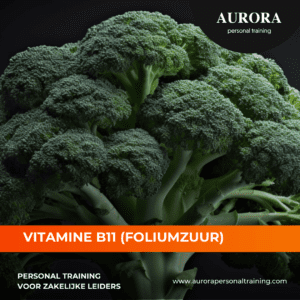The importance of Vitamin B11
The Importance of Vitamin B11, also known as folic acid, is an essential nutrient that is often overlooked in our diet. Even when following healthy dietary guidelines, we run the risk of not getting enough of this vitamin. Although the body can store small reserves, especially in the liver, a deficiency can quickly occur if our diet does not contain enough vitamin B11.
The role of Vitamin B11 is crucial for the growth and production of both red and white blood cells. For women who want to become pregnant, it is advisable to take extra vitamin B11 one to two months before conception. This vitamin plays an essential role in the formation of the nervous system of the unborn child, and a deficiency increases the risk of birth defects such as spina bifida, cleft lip or cleft palate. Natural sources of vitamin B11 are mainly vegetables and whole grain products.
Main functions of Vitamin B11:
- Fetal development: Vitamin B11 plays a crucial role from the first day after conception, especially in the formation of the nervous system of the fetus.
- Protein synthesis: Essential for the conversion of various amino acids, including the harmful homocysteine, and for the synthesis of proteins.
- Cell growth: Essential for the growth of various cells, especially those in the intestines, lungs, red and white blood cells.
Dietary sources of Vitamin B11:
In addition to the importance of supplements for women who want to get pregnant, it is advisable to include natural sources of vitamin B11 in your diet. Some examples and their amounts in micrograms are:
- Wheat mezels: 100g – 160
- Broad beans: 100g – 150
- Broccoli: 100g – 105
- Purslane: 100g – 100
- Soya beans: 100g – 95
- Wheat germ: 100g – 90
- Beetroot: 100g – 75
- Spinach: 100g – 70
Causes of Vitamin B11 Deficiencies:
- Alcohol/Smoking: Affects the absorption and conversion of vitamin B11.
- Medicines: Aspirin, antacids, the pill and antibiotics can negatively affect vitamin B11 levels.
- Disease: In conditions such as psoriasis, anemia and inflammation of the digestive tract and airways, there is an increased need for vitamin B11.
Uses of Vitamin B11:
- Arteriosclerosis: Vitamin B11 lowers homocysteine levels in the blood, which is a risk factor for cardiovascular disease.
- Birth defects: Supplements with extra vitamin B11 reduce the risk of birth defects.
- Infections: Sufficient vitamin B11 supports the immune system and helps fight inflammation.
- Gout: Inhibits the production of uric acid.
- Hormonal complaints: Plays a role in hormone balance, neurotransmitter and prostaglandin production together with vitamins B6 and B12.
Consequences of a disturbed Vitamin B11 balance:
- Anemia: Associated with fatigue, shortness of breath and difficulty concentrating.
- Birth defects: Increased risk of birth defects.
- Reduced nutrient absorption: With symptoms such as diarrhea, loss of appetite and weight loss.
Recommended daily amount:
- Men: 300 microgram
- Women: 300 microgram
Make sure you get enough vitamin B11 in your diet and consider supplements, especially during specific life stages such as pregnancy. It will not only benefit your own well-being but also the health of future generations.
